The life story of hockey player Han Su-jin
There was a girl with delicate features and noted musical talents who dreamed to be a pianist.
She entered the College of Music at Yonsei University after graduating from Yewon Middle School and the Seoul Arts High School, a typical path for the country's music elite.
The virtuosa, however, had a hidden skill in another field. She had outstanding reflexes. While struggling with school papers and playing the keyboard, in a corner of her heart she cherished a dream to play ice hockey. She longed for the dynamism of sprint-skating across the rink, body checking her opponent and slap shooting the puck into the net.
This is the story of pianist-turned-hockey player Han Su-jin. She has recently been training for the 2018 PyeongChang Winter Olympics, but she is, she said, more than happy, happier than ever before.
Korea.net sat down with her to hear more about her life story.
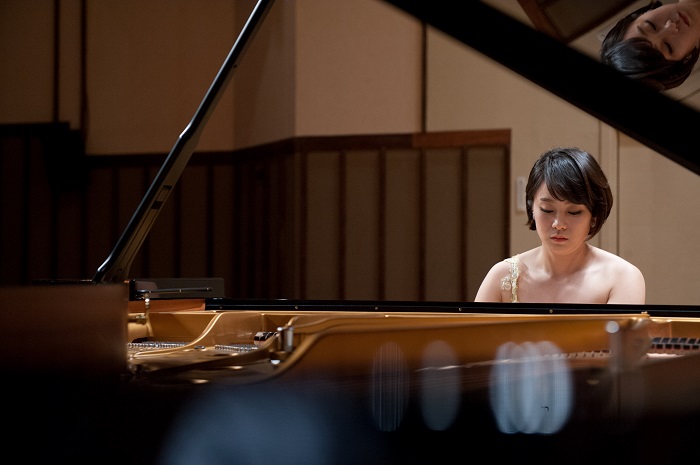
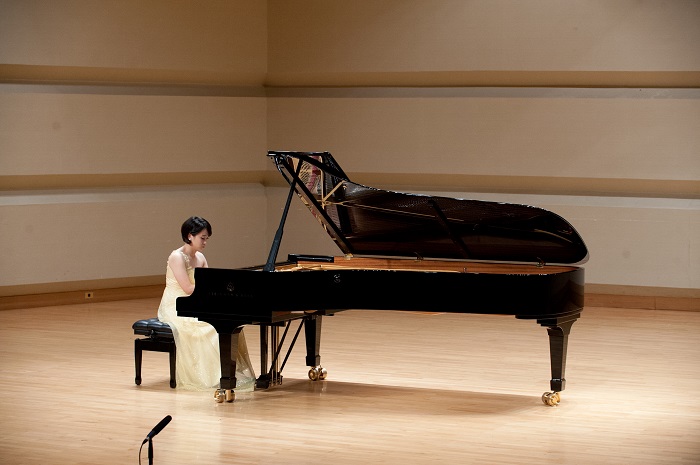
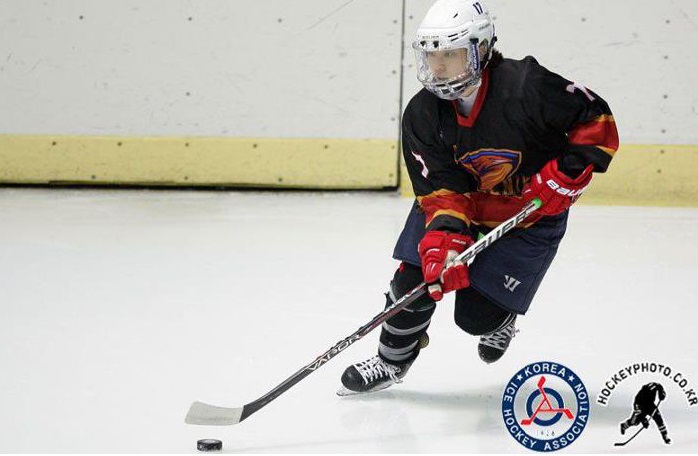
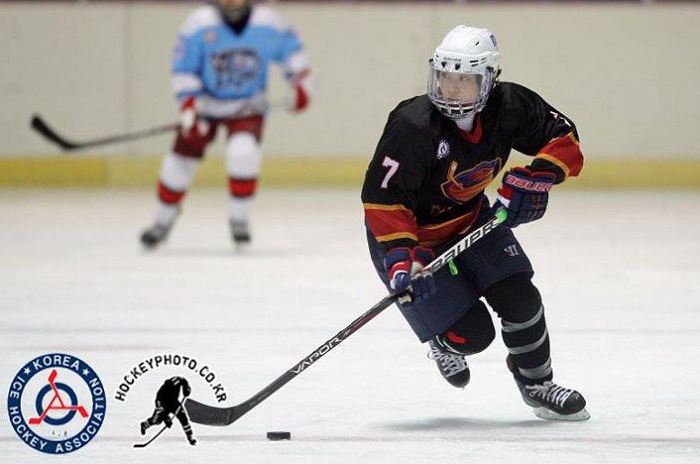
You received an education at Yewon Middle School and the Seoul Arts High School, and gained a degree in piano from Yonsei University. Then, you started a new career as a hockey player. It seems extraordinary. When, and how did you get involved in hockey for the first time?
When I was in grade five, I joined the ice hockey club with my friend who had just transferred in from the U.S. However, I had to quit the club the next year as I had to prepare for the entrance exam to Yewon Middle School. I played the sport for only about a year, but it was indeed a great experience and real fun.
If it interested you that much, didn't you think about changing your major or career at that time? Or did you think about pursuing the new career after you started high school?
Neither my parents nor I could have imagined that I would be absorbed by ice hockey as I am now. I forgot about hockey after getting into Yewon Middle School until I graduated from high school. Looking back, however, I did not cherish it that much in my heart.
One day on my way to a piano lesson, I happened to see a bunch of guys in high school playing hockey at the Mokdong Ice Rink, in western Seoul. That's when I realized that it was time to reignite my passion for hockey. I was promised by my parents that I would be able to play hockey again if I managed to get accepted to the university of which I and my family dreamed. I got into Yonsei University and joined the hockey club on campus.
You started the sport after university. You probably had a few more difficulties compared to your colleagues in terms of training or building teamwork. How was it?
With discipline, I was able to develop the teamwork needed and build a strict senior-junior relationship throughout my years at Yewon Middle School and at the Seoul Arts High School. It was okay. However, I had to practice more than my teammates who had a better technique or skills than I did. As I practiced harder, I found myself gradually developing into a decent player. That has been one of the most exciting things about this sport.
Without any inborn talent or super-fast reflexes, it would have been impossible to become a professional player through only passion or effort. Have you ever thought you had a talent at sports? Are there any athletes in your family?
I enjoy almost every sport other than hockey. To tell you the truth, one of my physical education teachers at high school told me that I should have applied for P.E. instead of music.
I loved almost every sport and always waited for P.E. class. Rather than having a natural aptitude, I think it was simply what I enjoyed. I liked it, and I enjoyed it, so I was getting better and better. My dad is not a professional player, but really loves baseball. I have a younger brother, too. He likes football, or soccer. All my family seems to enjoy sports, but I'm not sure it's in the genes.
During your university years, you simultaneously handled piano practices and sports club activities. Both must have required an abundant amount of effort. Wasn't it hard? Did you, by any chance, give a little more importance to either one?
When I was at university, I had to attend lectures during the daytime and receive training in the night. When I was at the training center in Taeneung, I couldn't practice piano. There was no choice. Whenever a practical test drew near, I had to visit private practice rooms near the training center early in the dawn. As soon as the practice was over, I got back to the training sessions.
In 2011, I took a few semesters off and visited Sapporo, Japan, to get some special training. I found myself in need of tactics and skills. In that sense, I might be able to say that I was a little more biased toward hockey than toward piano. I spent as many semesters as I was allowed to take off in Sapporo, and I was able to graduate seven years later than my colleagues.
Both piano and hockey involve the use of your hands. It seems that piano demands more sensitivity while hockey requires strength and concentration. As a player who majored in both fields, what is the biggest difference between the two?
I want to explain how it was a little different from that, in my personal view. For piano, I had to continue to practice for the exams. When I finished the final exam, I became somewhat aimless and distracted. Ice hockey, however, requires different techniques and skills, accuracy and proper timing, in every individual game. It always gave me plenty of things to learn and develop. It was limitless. There was no such thing like the "end" or "best forever" in hockey. It is the biggest difference between piano and hockey and the reason that I love hockey.
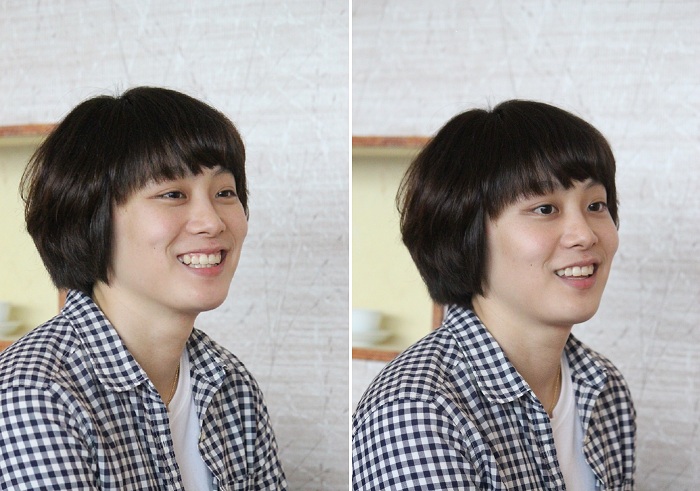
The 2018 PyeongChang Winter Olympics are just around the corner. It seems that there is still a long way to go, as you are yet to qualify. How are you preparing for this? What is your life plan from now on?
I have been training for about six hours per day for the PyeongChang Olympics. My parents suggested I go for a master's degree. For me, however, I want to concentrate solely on preparing for the Olympics. Sure, I am concerned about my future and future career, but now is the time to focus on the present.
My long-term dream is to keep pursuing a career as a hockey player and become a great leader.
Does "leader" refer to becoming a female hockey coach? Has there been any limits as a player? What do you think is needed for the development of hockey in Korea?
In the U.S. and Canada, the birthplace of hockey, it is normal for players to have two jobs. Even if you are a hockey player, you should find another job to make a living. The situation is worse in Korea, where no national team exists. We must have not only a national team, but also a number of secondary teams in order to achieve any global competitiveness.
The problem is that, in reality, we can't improve the situation immediately. It is an urgent matter to organize a team, but most of all, various types of institutional and financial investment must come first. Players are in need of better training, skills and technique.
We can learn a lesson from Japan and China. Both countries invested a significant portion of their provinces' budgets into player development and both have achieved outstanding results. Japan succeeded in qualifying for the 2014 Sochi Winter Olympics and created a huge gap ahead of Korea.
I hope that hockey will become more widely known on the occasion of the 2018 PyeongChang Winter Olympics, which, in turn, will result in more interest and investment. It might actually persuade people to play hockey, and then more teams will be created.
Here is the final question. What does hockey mean to you?
It is one of my best pleasures. The commute takes about four hours from my home in Bupyeong to Taeneung and back. Also, the training is really hard. However, it is great and rewarding to see myself change and develop.
I have high expectations and also great responsibility for the development of Korean female ice hockey. It surely is an area with great potential. I will enjoy every single moment playing hockey.
I believe that, someday, we will see a miracle, just as the Japanese team did.
By Lee Jeong-rok, Lee Seung-ah
Korea.net Staff Writers
jeongrok@korea.kr
There was a girl with delicate features and noted musical talents who dreamed to be a pianist.
She entered the College of Music at Yonsei University after graduating from Yewon Middle School and the Seoul Arts High School, a typical path for the country's music elite.
The virtuosa, however, had a hidden skill in another field. She had outstanding reflexes. While struggling with school papers and playing the keyboard, in a corner of her heart she cherished a dream to play ice hockey. She longed for the dynamism of sprint-skating across the rink, body checking her opponent and slap shooting the puck into the net.
This is the story of pianist-turned-hockey player Han Su-jin. She has recently been training for the 2018 PyeongChang Winter Olympics, but she is, she said, more than happy, happier than ever before.
Korea.net sat down with her to hear more about her life story.


Hockey player Han su-jin plays piano during Yonsei University's graduation concert.


Hockey player Han Su-jin trains at the Korea National Training Center in Taeneung. (HockeyPhoto = ChaeWoo Lim)
You received an education at Yewon Middle School and the Seoul Arts High School, and gained a degree in piano from Yonsei University. Then, you started a new career as a hockey player. It seems extraordinary. When, and how did you get involved in hockey for the first time?
When I was in grade five, I joined the ice hockey club with my friend who had just transferred in from the U.S. However, I had to quit the club the next year as I had to prepare for the entrance exam to Yewon Middle School. I played the sport for only about a year, but it was indeed a great experience and real fun.
If it interested you that much, didn't you think about changing your major or career at that time? Or did you think about pursuing the new career after you started high school?
Neither my parents nor I could have imagined that I would be absorbed by ice hockey as I am now. I forgot about hockey after getting into Yewon Middle School until I graduated from high school. Looking back, however, I did not cherish it that much in my heart.
One day on my way to a piano lesson, I happened to see a bunch of guys in high school playing hockey at the Mokdong Ice Rink, in western Seoul. That's when I realized that it was time to reignite my passion for hockey. I was promised by my parents that I would be able to play hockey again if I managed to get accepted to the university of which I and my family dreamed. I got into Yonsei University and joined the hockey club on campus.
You started the sport after university. You probably had a few more difficulties compared to your colleagues in terms of training or building teamwork. How was it?
With discipline, I was able to develop the teamwork needed and build a strict senior-junior relationship throughout my years at Yewon Middle School and at the Seoul Arts High School. It was okay. However, I had to practice more than my teammates who had a better technique or skills than I did. As I practiced harder, I found myself gradually developing into a decent player. That has been one of the most exciting things about this sport.
Without any inborn talent or super-fast reflexes, it would have been impossible to become a professional player through only passion or effort. Have you ever thought you had a talent at sports? Are there any athletes in your family?
I enjoy almost every sport other than hockey. To tell you the truth, one of my physical education teachers at high school told me that I should have applied for P.E. instead of music.
I loved almost every sport and always waited for P.E. class. Rather than having a natural aptitude, I think it was simply what I enjoyed. I liked it, and I enjoyed it, so I was getting better and better. My dad is not a professional player, but really loves baseball. I have a younger brother, too. He likes football, or soccer. All my family seems to enjoy sports, but I'm not sure it's in the genes.
During your university years, you simultaneously handled piano practices and sports club activities. Both must have required an abundant amount of effort. Wasn't it hard? Did you, by any chance, give a little more importance to either one?
When I was at university, I had to attend lectures during the daytime and receive training in the night. When I was at the training center in Taeneung, I couldn't practice piano. There was no choice. Whenever a practical test drew near, I had to visit private practice rooms near the training center early in the dawn. As soon as the practice was over, I got back to the training sessions.
In 2011, I took a few semesters off and visited Sapporo, Japan, to get some special training. I found myself in need of tactics and skills. In that sense, I might be able to say that I was a little more biased toward hockey than toward piano. I spent as many semesters as I was allowed to take off in Sapporo, and I was able to graduate seven years later than my colleagues.
Both piano and hockey involve the use of your hands. It seems that piano demands more sensitivity while hockey requires strength and concentration. As a player who majored in both fields, what is the biggest difference between the two?
I want to explain how it was a little different from that, in my personal view. For piano, I had to continue to practice for the exams. When I finished the final exam, I became somewhat aimless and distracted. Ice hockey, however, requires different techniques and skills, accuracy and proper timing, in every individual game. It always gave me plenty of things to learn and develop. It was limitless. There was no such thing like the "end" or "best forever" in hockey. It is the biggest difference between piano and hockey and the reason that I love hockey.

Player Han Su-jin smiles while talking about the merits of hockey. (photo: Wi Tack-whan)
The 2018 PyeongChang Winter Olympics are just around the corner. It seems that there is still a long way to go, as you are yet to qualify. How are you preparing for this? What is your life plan from now on?
I have been training for about six hours per day for the PyeongChang Olympics. My parents suggested I go for a master's degree. For me, however, I want to concentrate solely on preparing for the Olympics. Sure, I am concerned about my future and future career, but now is the time to focus on the present.
My long-term dream is to keep pursuing a career as a hockey player and become a great leader.
Does "leader" refer to becoming a female hockey coach? Has there been any limits as a player? What do you think is needed for the development of hockey in Korea?
In the U.S. and Canada, the birthplace of hockey, it is normal for players to have two jobs. Even if you are a hockey player, you should find another job to make a living. The situation is worse in Korea, where no national team exists. We must have not only a national team, but also a number of secondary teams in order to achieve any global competitiveness.
The problem is that, in reality, we can't improve the situation immediately. It is an urgent matter to organize a team, but most of all, various types of institutional and financial investment must come first. Players are in need of better training, skills and technique.
We can learn a lesson from Japan and China. Both countries invested a significant portion of their provinces' budgets into player development and both have achieved outstanding results. Japan succeeded in qualifying for the 2014 Sochi Winter Olympics and created a huge gap ahead of Korea.
I hope that hockey will become more widely known on the occasion of the 2018 PyeongChang Winter Olympics, which, in turn, will result in more interest and investment. It might actually persuade people to play hockey, and then more teams will be created.
Here is the final question. What does hockey mean to you?
It is one of my best pleasures. The commute takes about four hours from my home in Bupyeong to Taeneung and back. Also, the training is really hard. However, it is great and rewarding to see myself change and develop.
I have high expectations and also great responsibility for the development of Korean female ice hockey. It surely is an area with great potential. I will enjoy every single moment playing hockey.
I believe that, someday, we will see a miracle, just as the Japanese team did.
By Lee Jeong-rok, Lee Seung-ah
Korea.net Staff Writers
jeongrok@korea.kr